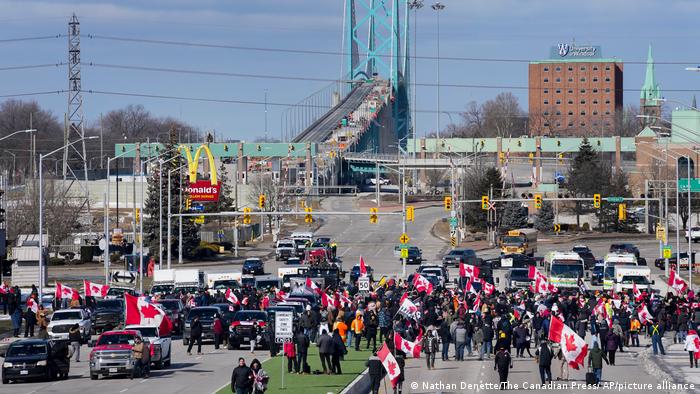
The Ambassador Bridge, which connects the US and Canada, reopened late Sunday after COVID demonstrations closed off the vital international trade corridor.
The owner of the bridge, Detroit International Bridge Co., told the AP news agency and local Detroit outlets that "the Ambassador Bridge is now fully open allowing the free flow of commerce between the Canada and US economies once again."
A Canadian mayor said earlier in the day that the standoff on the key US border bridge was at an end.
Windsor City Mayor Drew Dilkens tweeted: "Today, our national economic crisis at the Ambassador Bridge came to an end. Border crossings will reopen when it is safe to do so and I defer to police and border agencies to make that determination."
Canadian police successfully cleared protesters and vehicles that had blocked the vital trade route.
The US, which pushed for a quick resolution to the border blockade, praised the actions of Windsor police.
White House national security advisor Liz Sherwood-Randall said Washington recognized "the imperative of taking swift, strong action and deterring future blockades."
Police escalate their response
Windsor Police upped the ante on Sunday by placing bridge protesters in handcuffs, towing vehicles and reclaiming clogged lanes, saying that "there will be zero tolerance for illegal activity."
In total, between 25 and 30 people were arrested by authorities.
"The arrested persons are all facing a charge of mischief. Multiple vehicles within the demonstration area were also seized," Windsor Police said in a statement.
The arrests came after a tense standoff between Canadian police and demonstrators, which escalated on Friday when a court order and threats of detention failed to end the blockade.
Access to the key trade route between Canada and the US had been blocked as protests against coronavirus restrictions occurred in a number of Canadian cities, including the capital, Ottawa.
Some 180 protesters were blocking the Ambassador Bridge linking Windsor in the Canadian province of Ontario with the US city of Detroit, even after Canadian police succeeded in persuading demonstrators to move some trucks barricading the crossing earlier on Saturday. A first arrest was made by Windsor police on Saturday evening for a criminal offense in relation to the demonstration.
The bridge carries a quarter of all trade between the two countries, and the disruptions to traffic are believed to have caused millions of dollars in additional cost in the automobile sector alone so far. An order to end the blockade was issued by a court on Friday.
Police say many demonstrators 'aggressive'
In Ottawa, where protesters have been encamped since a convoy of truckers arrived in late January, police say some 4,000 demonstrators were gathered on Saturday. Many people arrived from outside the city to join the protests.
Although politicians and residents have called for the protests to be dispersed, police say they are limited in what they can do.
"Safety concerns — arising from aggressive, illegal behavior by many demonstrators — limited police enforcement capabilities,'' Ottawa police said in a statement late Saturday.
They said a joint command center had now been set up together with the Ontario Provincial Police and the Royal Canadian Mounted Police.
Both federal and provincial leaders say they are not able to tell police what to do.
Prime Minister Justin Trudeau, who has called the protesters a "fringe" of Canadian society, has so far rejected calls to bring in the military. But his office has said authorities would not hesitate to pull out all the stops, if necessary.
"The prime minister stressed that border crossings cannot, and will not, remain closed and that all options are on the table,'' it said in a statement late Saturday after Trudeau met with senior officials.
The protests in Ottawa have provoked complaints by many residents, with protesters often displaying loud or otherwise offensive behavior. On Saturday, some tore down a fence that had been erected around the National War Memorial after demonstrators urinated on it.
The majority of Canadians have supported the country's relatively strict pandemic measures, which are seen as having played a big role in keeping the COVID-19 death rate down to a third of that of the neighboring US.
Protests spread around the world
Demonstrations were also seen on the other side of the country, with protesters disrupting another border crossing between Surrey in British Columbia and Blaine in the US state of Washington. Border crossings in Alberta and in Manitoba were also affected.
The protests in Canada, which police say have been partly funded by US supporters, have inspired similar actions in a number of other countries,including France, the Netherlands, Australia and New Zealand. The US Department of Homeland Security has also warned that truck convoys may be planned in the United States.
Even as the protests continue in Canada, a number of the measures are being lifted as infections drop again following a surge caused by the omicron variant.